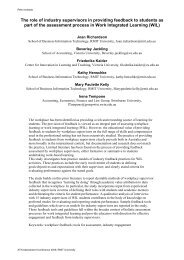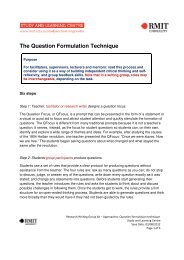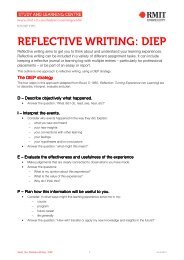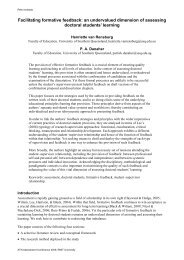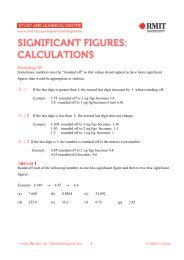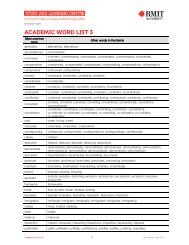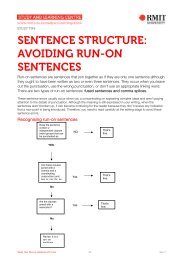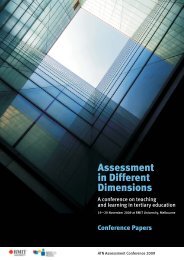student feedback and leadership - Office for Learning and Teaching
student feedback and leadership - Office for Learning and Teaching
student feedback and leadership - Office for Learning and Teaching
Create successful ePaper yourself
Turn your PDF publications into a flip-book with our unique Google optimized e-Paper software.
Student Feedback & Leadership<br />
in a smaller lecture theatre. Hence, controlling <strong>for</strong> differences in teaching style<br />
<strong>and</strong> comparing classes taught by the same lecturer should hopefully allow <strong>for</strong><br />
a more direct GTS comparison <strong>and</strong> assessment of the effect of large class<br />
sizes on <strong>student</strong> satisfaction.<br />
What was the impact on <strong>student</strong> <strong>feedback</strong>?<br />
This is discussed in section 4.0.<br />
Were there changes in <strong>student</strong> learning <strong>and</strong> experiences?<br />
Yes, as discussed in the preceding sections.<br />
How are the <strong>student</strong>s being taught differently? Eg teaching strategies,<br />
structure & size of classes etc<br />
Again, this has been discussed in the preceding sections.<br />
What other impacts (including long term outcomes) were there?<br />
Long term outcomes are yet to be fully recognised. However, the School<br />
is actively encouraging staff to undertake course development <strong>and</strong> providing<br />
support through the provision of teaching grants. These grants, which are<br />
by application, are also viewed as a precursor to applying <strong>for</strong> an LTIF grant.<br />
Were there any tangible outcomes eg Grants, scholarship etc<br />
An LTIF grant was received to support the development of the trial of the<br />
‘audience response system’ <strong>and</strong> development of podcasts in MKTG1025<br />
Marketing Principles. Further, the course coordinator, Raju Mulye, was<br />
recognised with a University <strong>Teaching</strong> Award, primarily as a result of his<br />
ef<strong>for</strong>ts with the course over the last few years.<br />
8.6 Critical Success Factors<br />
What were the contributors to success?<br />
The contributing factors to the success of this project were as follows:<br />
––<br />
Support from HOS <strong>and</strong> funding provided <strong>for</strong> ongoing development.<br />
––<br />
Initiative shown by Course Coordinators <strong>and</strong> various course team<br />
members despite a very full workload.<br />
––<br />
Support <strong>and</strong> assistance from other School staff members at various<br />
points in the project.<br />
– – The use of a research assistant in undertaking the quantitative analysis<br />
of the CES data.<br />
Page 110



